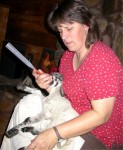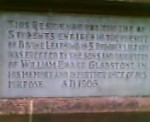 I found this picture with a Google search (for something like Chinese Jesus Good Shepherd). Although it does stand accusation of Victorian tweeness, there is something very tender and appealing about the shepherd cradling the lamb so closely that only its head peeps out into the wide world. This feels like a good shepherd who protects his tiny little lamb from harm and is determined to deliver it safely. I also quite like the two accompanying sheep who are so hot on his heels as if to ensure he does his job properly!
I found this picture with a Google search (for something like Chinese Jesus Good Shepherd). Although it does stand accusation of Victorian tweeness, there is something very tender and appealing about the shepherd cradling the lamb so closely that only its head peeps out into the wide world. This feels like a good shepherd who protects his tiny little lamb from harm and is determined to deliver it safely. I also quite like the two accompanying sheep who are so hot on his heels as if to ensure he does his job properly!
In the end, my sermon has evolved or appeared, not sure which, as a kind of pre-birth to post-death journey through the 23rd Psalm. The complicated and confusing John passage just did not offer itself into my thinking, and the Gospel - good news -spoke out of the psalm.
So, for what it's worrth, here it is - minus its introductory stuff - even before my folk get it! (And yes, before you comment, I know some bits are simplistic but it's my attmept to be pastoral after last week's 'Follow Me')
So far as the lamb is concerned, the shepherd has always been there. Even before its birth, the shepherd was there on the hillside patiently watching and waiting. A hired worker might have been at home in the warm or distracted by other things going on, but the shepherd is utterly dependable. And as the lamb is born, as the harshness of the air fills its lungs and it utters its first hesitant bleat, the shepherd is on hand to ensure that all is well, and that if it is not, what is needful is arranged.
One of the great wonders we are reminded to ponder is that long before we were, as the saying goes, a twinkle in our father’s eye, the Good Shepherd was already there, waiting, preparing and anticipating. Long before we are able to recognise or name Jesus as Lord, he is there, ensuring that all that is necessary is available for us. Of course, we must beware an over simplistic, rose-tinted view of this: there are many people in the world who do not have their material needs met, but our generous and loving God has ensured that there is sufficient for all – if only we might learn to share.
The Lord is my shepherd, I have everything I need
He makes me lie down in green pastures
He leads me beside quiet waters He restores my soul.
Having survived the traumas of birth, the young lamb begins to grow in strength and to explore the world around it. Here is cool water to drink, there is lush grass to eat, and in the distance… well just what might be over that next hill? Even as the lamb grows up, the shepherd is still on hand. The good shepherd does not keep intervening as the lamb makes discoveries for itself, yet it still needs some guidance if it is to survive into maturity. Learning that this shepherd is trustworthy – perhaps having bottle fed the lamb, perhaps having rescued it from a perilous ledge, perhaps having brought extra food when pasture was poor – the lamb accepts the shepherd’s voice, and responds accordingly.
As we begin to follow Jesus, he remains with us, calling us onwards. But he also gives us space to explore, to grow and develop. Most of the time, life simply carries on. We enjoy new experiences, develop our human gifts, perhaps marry and have children of our own. At the same time, we learn about life. Mostly we get it about right, but sometimes we make unwise choices, and sometimes we go to dangerous places, literally or metaphorically. If Jesus stepped instantly to make things ‘right’ we’d never grow to maturity, never reach our God-given potential. Yet, he is never far away from us, and we learn that his voice – revealed in scripture, echoed the lives of others - is to be trusted, and that to follow him is to be led nearer and nearer to ultimate fulfilment.
He guides me in the paths of righteousness
The risks to the growing lamb are not only the results of its own actions, there can be outside influences that put its life in peril. The Bible speaks of wolves and other wild animals attacking and stealing lambs and sheep. In Scotland it is not unknown for eagles to snatch lambs and even in Leicestershire is the potential of sheep stealing. And even if the predators don’t attack, there is always potential for natural disaster – flood or fire can destroy pastureland or drought empty rivers. Injury or disease can wreak havoc in a previously healthy flock. Having a good shepherd does not mean immunity from the perils of real life, the vulnerability to unexpected and disastrous occurrences.
So it is for us, the analogy is straightforward. Bad things happen to good people. Christians get sick, missionaries are murdered, outreach projects destroyed by natural disaster. Having Jesus as out Good Shepherd does not inoculate us from pain or suffering, but it does transform our experience of it because, having learned that our shepherd is trustworthy, and followed him in the past, we have confidence that he continues to be with us, not lifting us out of reality but accompanying us through it.
Even though I walk through the valley of the shadow of death
I will fear no evil for you are with me
Your rod and staff they comfort me
The fully-grown lamb – now a sheep – has a destiny, something that was determined if not before, then soon after its birth. It could be, as my friend loves to remind me, that its destiny is the table. In Jesus’ day, and certainly if it was near Jerusalem, it was more likely to be as a sacrificial offering to God. Some sheep would find their purpose in providing wool to make clothes, others would provide milk for cheese, yet more would act as mothers to produce more lambs.
For us, too, there is a purpose in life – in this world and the next. As different sheep have different roles in the flock, so too do we as members of both church and society. Part of our calling, as individuals and as a church, is to fulfil those roles, not envying others their tasks or shying away from our own.
Perhaps the ultimate purpose for the sheep – though not the one it might choose for itself – was to be offered to God. For the lamb, or sheep, this meant death, the end of its natural life, for the glory of God. This is why as well as being called the Good Shepherd, Jesus is also known as the Lamb of God, the ultimate sacrifice. Fortunately, for us, the call, the command, that we follow Jesus, is about attitude rather than literal action. To offer our lives to God is to fulfil the ultimate purpose for which we were born. The Good Shepherd who has birthed us, nurtured us, rescued us, and accompanied us has also shown us, by his death and resurrection our ultimate destiny. For here is the mystery – death and sin do not get the last word, Christ has defeated them both and gone ahead to lead his sheep to the father’s house…
You prepare a table before me
You anoint my head with oil
My cup overflows And I will dwell in the house of the Lord – forever! Amen!
 And here, just to end is another 'good shepherd' picture from Google...
And here, just to end is another 'good shepherd' picture from Google...
 I found this picture with a Google search (for something like Chinese Jesus Good Shepherd). Although it does stand accusation of Victorian tweeness, there is something very tender and appealing about the shepherd cradling the lamb so closely that only its head peeps out into the wide world. This feels like a good shepherd who protects his tiny little lamb from harm and is determined to deliver it safely. I also quite like the two accompanying sheep who are so hot on his heels as if to ensure he does his job properly!
I found this picture with a Google search (for something like Chinese Jesus Good Shepherd). Although it does stand accusation of Victorian tweeness, there is something very tender and appealing about the shepherd cradling the lamb so closely that only its head peeps out into the wide world. This feels like a good shepherd who protects his tiny little lamb from harm and is determined to deliver it safely. I also quite like the two accompanying sheep who are so hot on his heels as if to ensure he does his job properly! And here, just to end is another 'good shepherd' picture from Google...
And here, just to end is another 'good shepherd' picture from Google... St Deiniol's was a great place to read, read some more, type, type lots more, delete it, retype it, eat, sleep... and discover that the the warden was my 'old' university chaplain from the 1980's! A real Brian Howden moment. Not too keen on the lukewarm showers or the absence of chocolate (plenty in corner shop though) but the Welsh cakes were good! Had a chuckle to myself over the concept of 'divine learning' (in the inscription, left) - just what might that mean to different people?
St Deiniol's was a great place to read, read some more, type, type lots more, delete it, retype it, eat, sleep... and discover that the the warden was my 'old' university chaplain from the 1980's! A real Brian Howden moment. Not too keen on the lukewarm showers or the absence of chocolate (plenty in corner shop though) but the Welsh cakes were good! Had a chuckle to myself over the concept of 'divine learning' (in the inscription, left) - just what might that mean to different people? I stopped off for diesel at a service stattion and had to do a double take at a sign that said Christ Car Wash. Yup, it was for real, a German firm evidently. Just made me smile - does it wash cleaner than others do? If people with points in their licences go through it, do they come out without them (not that I need to find out, of course)?
I stopped off for diesel at a service stattion and had to do a double take at a sign that said Christ Car Wash. Yup, it was for real, a German firm evidently. Just made me smile - does it wash cleaner than others do? If people with points in their licences go through it, do they come out without them (not that I need to find out, of course)?